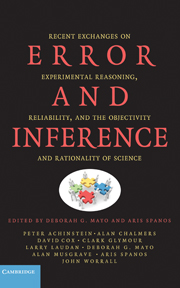 Error and Inference
Error and Inference Published online by Cambridge University Press: 29 January 2010
Statistics and Inductive Philosophy
What Is the Philosophy of Statistics?
The philosophical foundations of statistics may be regarded as the study of the epistemological, conceptual, and logical problems revolving around the use and interpretation of statistical methods, broadly conceived. As with other domains of philosophy of science, work in statistical science progresses largely without worrying about “philosophical foundations.” Nevertheless, even in statistical practice, debates about the different approaches to statistical analysis may influence and be influenced by general issues of the nature of inductive-statistical inference, and thus are concerned with foundational or philosophical matters. Even those who are largely concerned with applications are often interested in identifying general principles that underlie and justify the procedures they have come to value on relatively pragmatic grounds. At one level of analysis at least, statisticians and philosophers of science ask many of the same questions.
What should be observed and what may justifiably be inferred from the resulting data?
How well do data confirm or fit a model?
What is a good test?
Does failure to reject a hypothesis H constitute evidence confirming H?
How can it be determined whether an apparent anomaly is genuine? How can blame for an anomaly be assigned correctly?
Is it relevant to the relation between data and a hypothesis if looking at the data influences the hypothesis to be examined?
How can spurious relationships be distinguished from genuine regularities?
How can a causal explanation and hypothesis be justified and tested?
[…]
To save this book to your Kindle, first ensure no-reply@cambridge.org is added to your Approved Personal Document E-mail List under your Personal Document Settings on the Manage Your Content and Devices page of your Amazon account. Then enter the ‘name’ part of your Kindle email address below. Find out more about saving to your Kindle.
Note you can select to save to either the @free.kindle.com or @kindle.com variations. ‘@free.kindle.com’ emails are free but can only be saved to your device when it is connected to wi-fi. ‘@kindle.com’ emails can be delivered even when you are not connected to wi-fi, but note that service fees apply.
Find out more about the Kindle Personal Document Service.
To save content items to your account, please confirm that you agree to abide by our usage policies. If this is the first time you use this feature, you will be asked to authorise Cambridge Core to connect with your account. Find out more about saving content to Dropbox.
To save content items to your account, please confirm that you agree to abide by our usage policies. If this is the first time you use this feature, you will be asked to authorise Cambridge Core to connect with your account. Find out more about saving content to Google Drive.